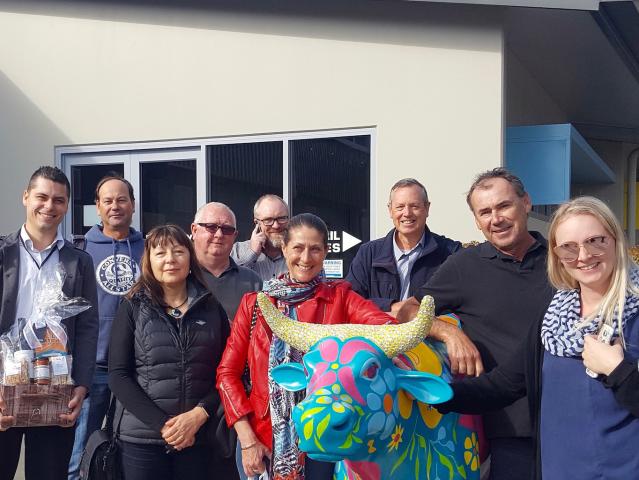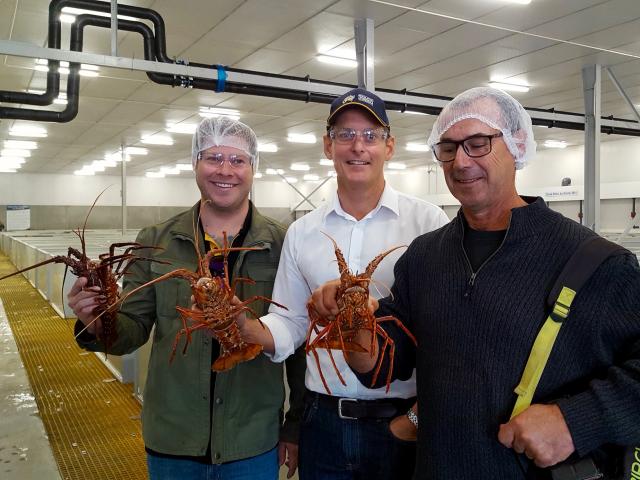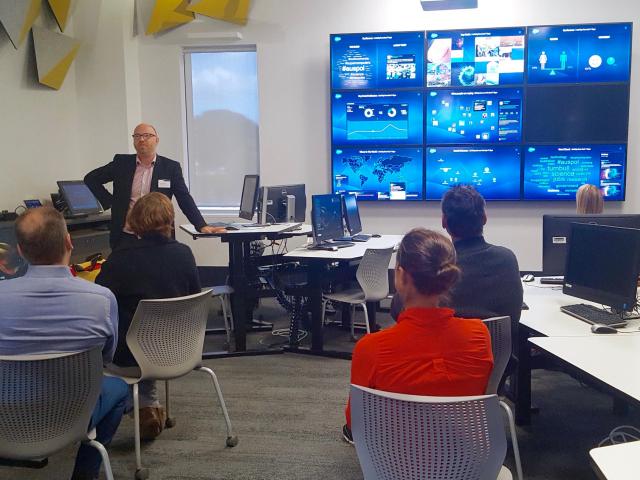In this edition...
Free pest and disease management training for apple and pear growers
Western Australian apple and pear growers are invited to attend free training in Integrated Pest and Disease Management (IPDM) in Balingup and Walliston to help preserve orchard health and viability.
Clarity on pests and diseases to yield quality truffles
A team of research and development officers from across Australia have been working on a project since May 2015 to clarify pests and diseases to improve the quality of Australian truffles.
Networking invaluable on food and beverage tour
Networking, knowledge-sharing and a first-hand look at the facilities and innovative techniques of a select group of Western Australian businesses, were highlights of the Food Industry Innovation project’s first Regional Food and Beverage Business Study Tour held earlier this year.
Expert support program to help food businesses reach potential
About 25 Western Australian premium food and beverage businesses have registered their interest for the Food Industry Innovation project’s new Expert for a Day initiative and other business support programs.
DPIRD and CGA host Tomato Field Day
More than 25 Carnarvon growers and industry representatives Australia-wide, attended a Department of Primary Industries and Regional Development (DPIRD) Tomato Field Day, held in collaboration with the Carnarvon Growers Association (CGA) recently.
Free pest and disease management training for apple and pear growers
Western Australian apple and pear growers are invited to attend free training in Integrated Pest and Disease Management (IPDM) in Balingup and Walliston to help preserve orchard health and viability.
Agriculture Victoria entomologist, David Williams, who is recognised nationally and internationally for expertise in IPDM development and adoption, will be the key speaker at nine workshops being held around Australia in August and September.
David will be joined by the Department of Primary Industries and Regional Development’s local expert senior research officer Stewart Learmonth and fellow entomologist from Michigan State University, Christopher Adams.
These free workshops will focus on pests and diseases affecting local orchards in each state, including control measures and chemical interactions.
Orchardists will hear case studies of successful IPDM initiatives and be guided through a process of developing their individual IPDM plans for the coming season.
Participants will also have an opportunity to identify a local pest or disease management issue for further study and will be provided feedback on a recently released IPDM manual.
The Balingup workshop will be held on Wednesday 29 August from 11am to 3pm while the Walliston training will be delivered on Thursday 30 August from 11am to 3pm.
For more information about the workshops, contact Susie Murphy White or register online.
The workshops are part of the IPDM project funded by Hort Innovation using the Apple and Pear research and development levy and funds from the Australian Government.
The Victorian Department of Economic Development, Jobs, Transport and Resources (DEDJTR) is delivering the project in collaboration with Queensland Department of Agriculture and Fisheries, NSW Department of Primary Industries, Western Australia’s Department of Primary Industries and Regional Development, Tasmania’s Institute of Agriculture and Lenswood Cooperative.
Clarity on pests and diseases to yield quality truffles
A team of research and development officers from across Australia have been working on a project since May 2015 to clarify pests and diseases to improve the quality of Australian truffles.
With most truffles produced in Western Australia, the Department of Primary Industries and Regional Development (DPIRD) is the lead agency in the project, based at the DPIRD Manjimup Horticultural Research Facility.
The project activities were guided by the results of a grower survey however, one-on-one involvement with growers across the nation yielded significant new information on pests and diseases.
New findings include:
- slaters cause just as much direct feeding damage to truffle as the more widely known pest, slugs
- at least three species of millipedes cause direct feeding damage to truffles
- springtails appear to be able to damage sound truffles
- truffle that form close to and/or above the soil surface are more likely to be damaged by invertebrates
- identification of a native species of beetle that feeds only on truffles that occurs across southern Australia. It is not currently a widespread pest but has the potential to be a major concern
- the discovery of a truffle-damaging slug species, hedgehog slug, not previously thought to occur in WA
- clarification of which recorded tree diseases are important in hazelnut orchards
- identification of a fungal disease of oak trees not previously known to occur in WA.
Information and photos of these pests and diseases and others are available on the DPIRD website in the truffle bulletin.
Given the significant damage invertebrates can cause to truffles an easy to use orchard monitoring system has been developed.
This simple method allows growers to measure pest types and abundance in their orchard and therefore the likelihood of damage.
To help growers identify the type of invertebrate that may be damaging truffles during harvest and grading, a truffle damage guide was produced.
With the information from orchard and harvest monitoring truffle growers can decide whether they need to reduce the numbers of invertebrates and assess the impact of any management practices used.
Some of the key management practices include:
- making orchards less suitable breeding places by:
- pruning the host trees to let light in
- desuckering hazelnut trees to reduce the creation of favourable microhabitats that suckers otherwise provide by accumulating falling leaves
- removing leaf litter from the orchard floor
- minimal irrigation for truffle production and avoid overwatering that may promote invertebrates as well as tree diseases
- cultivation to encourage truffles to form at a greater depth which from a separate study was shown to reduce rot in truffles
- regular covering of truffles that breach the soil surface to provide a physical barrier; also shown to reduce rot in truffles.
This season harvested truffles are being assessed to try to quantify the monetary losses resulting from feeding by invertebrates.
Their damage increases the time and therefore the cost to clean and grade truffles, reduces the yield of truffle and most importantly, results in chewed truffles being downgraded to a lower value class.
This translates to a major loss due to reduced value.
With many truffles being traded overseas, they will be rejected at inspection if live invertebrates are found.
Therefore any chance of truffles being infested increases the time to carefully check them during grading.
While reducing damage to truffles by invertebrates has been a major focus of the project, some significant work on tree diseases has also been undertaken.
A field study on hazelnut trees has clarified the importance of a range of diseases.
Plans are underway to do the same for the other major host tree, oaks.
Following the identification of a new disease of oak trees in WA, suggestions on orchard management will be made to try to reduce the importance of the disease in that orchard.
During the year we have participated in extension activities in Manjimup/Pemberton, where the annual Truffle Kerfuffle is held, and have undertaken a study trip to eastern Australia.
The project team has recently published a newsletter on recent activities.
Reports on these and other truffle related matters can be found on the DPIRD website.
The project concludes in January 2019 and work will continue with growers up to this time to further clarify the occurrence and management of pests and diseases in orchards.
This project has been funded by DPIRD, AgriFutures, The Australian Truffle Growers’ Association, Truffle Producers of Western Australia and in-kind support from the Australian National University and NSW Department of Primary Industries.
For more information contact Alison Mathews, Development Officer, Manjimup on +61 (0)8 9777 0122.
Networking invaluable on food and beverage tour

Networking, knowledge-sharing and a first-hand look at the facilities and innovative techniques of a select group of Western Australian businesses, were highlights of the Food Industry Innovation project’s first Regional Food and Beverage Business Study Tour held earlier this year.
Twelve agrifood stakeholders participated in the tour which included visits to a cross-section of WA food and beverage businesses, the opportunity to speak with business owners about their journeys, and presentations from industry experts.
Starting in Perth, the first stop was Curtin University’s School of Luxury Branding where researchers use innovative psychophysiological equipment to measure a consumer’s physical responses to stimuli. Eye tracking, facial recognition and measuring brain waves are just a few ways the consumer experience is being measured.
Study tour participants also visited Curtin’s ‘The Agency’ and Social Media Command Centre which is designed to simulate a contemporary marketing communication consultancy. The teaching and research facility boasts nine large screen monitors, allowing for real-time online trend tracking and social media marketing analytics for actual events and campaigns.
The group was excited to learn about industry engagement opportunities with Curtin in the areas of luxury branding research, social media marketing and digital analytics.
Other Perth-based business hosts included Whipper Snapper Distillery, Geraldton Fishermen’s Cooperative, Fremantle Octopus and Mundella Foods. Participants were especially interested to hear about Geraldton Fishermen’s Co-op’s marketing into China, direct sales and online successes.
A networking dinner was held at The Shoe Bar and Café in Yagan Square - a Buy West Eat Best program member that sources locally farmed, fished and produced ingredients. The department’s Buy West Eat Best program manager Melissa Worthington attended the dinner, providing tour participants with information about the program and membership opportunities.
The tour continued down to the State’s South West, where the second networking dinner was held at Swings Taphouse in Margaret River. South West Development Commission’s TradeStart manager Mat Lewis along with TradeStart advisor Simon Taylor provided attendee’s valuable insight into the TradeStart program along with advice for new businesses planning to export.
The following day included a site visit to Margaret River Dairy Company, an industry networking lunch at Amelia Park Restaurant to hear two regional business heroes share their journeys to export success, and a tour of the backhouse value-adding facilities, including the bakery at Bunbury Farmers’ Market.
For more information about upcoming study tours and networking opportunities, email the Food Industry Innovation team at: or register your interest in FII business support programs.

Expert support program to help food businesses reach potential
About 25 Western Australian premium food and beverage businesses have registered their interest for the Food Industry Innovation project’s new Expert for a Day initiative and other business support programs.
Expert for a Day was launched in May at Amelia Park restaurant in Margaret River and is designed to help premium food and beverage producers reach their full potential, overcome barriers to growth and capture new market opportunities.
It is among a suite of programs offered by the department to support the State’s premium food and beverage businesses break new ground and deliver outstanding product to customers domestically and abroad.
By providing support for initial engagement with expert service providers, the project aims to inspire ongoing use of skilled advisers and enhance the capability of WA premium agrifood businesses.
Eligible businesses will have access to a range of industry experts whose skill sets address gaps or ‘opportunities for improvement’ identified in the Premium Agrifood Market Opportunity report.
This includes expert advice in branding and marketing; packaging and labelling; e-commerce; logistics; sales capacity; pricing strategies; process engineering; food technology and exporting premium food and beverages.
Registrations are still open for participation in the Expert for a Day initiative and other support programs.
For more information, contact the Food Industry Innovation team via email.
DPIRD and CGA host Tomato Field Day

More than 25 Carnarvon growers and industry representatives Australia-wide, attended a Department of Primary Industries and Regional Development (DPIRD) Tomato Field Day, held in collaboration with the Carnarvon Growers Association (CGA) recently.
The event, held at DPIRD’s Carnarvon Research Station, showcased tomato variety screening trials managed by the department, CGA and local seed suppliers.
Acting Research Station Manager Graeme Sinclair said the day was a great success, with representatives from five of the seven seed companies participating in the tomato trials attending the event.
Now in the fourth year of operation, the trial reviewed 2000 tomato plants from 109 different varieties for yield, quality and vigour with a focus this year on ‘next generation disease packages’.
Companies were invited to submit plants that had three of the following resistance traits; nematodes, fusarium race 3, tomato spotted wilt virus or powdery mildew.
As part of the next generation varieties, this information is provided back to growers to enable them to make informed decisions on varietal choices for the following season.
The field day offered a great insight into horticultural growing conditions and the work being undertaken in Carnarvon.
In future years it is hoped that there may be potential to trial other crops such as capsicums and cucurbit lines which are at the pre-commercial release stage.
For more information contact Valerie Shrubb, Manager, Carnarvon, on + 61 (0)8 9956 3322.


